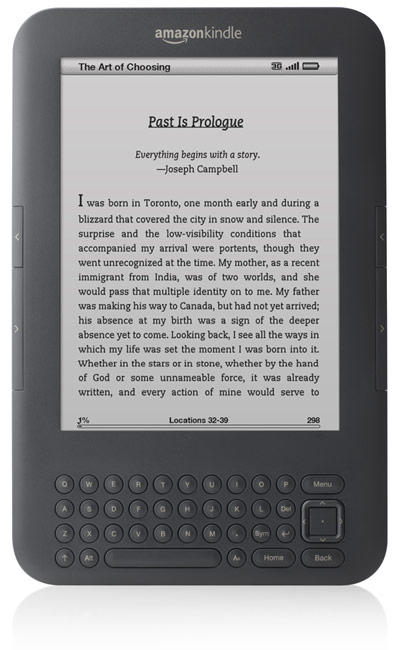I had debated on getting a Kindle for a while. I love to read, though with school and work I often don’t have too much extra time to read for fun. For whatever reason, I never utilize the library and usually just buy books I’m interested in off of eBay or half.com. I had some reservations about the Kindle. Mainly, I like to be able to put my finger in a book and compare progress made to progress yet-to-make. There’s also the physical presence of a book. I’ll discuss that more in a bit.
At any rate, I asked for and received a Kindle for Christmas. I was about halfway done with my physical copy of The Heart Is A Lonely Hunter, but I said screw it and ordered the Kindle edition so I could check out my new Christmas present. It was weird reading on it for about six pages and then I didn’t even pay any attention to to the fact that I wasn’t reading a physical book. The e-ink screen actually looks like paper and after that very short awkward period I completely fell in love with my Kindle. I’m still figuring everything out, but I like everything about it thus far.
What about the fact that I can’t stick my finger in it? As a given, anything that denies itself to fingering is kind of lame, but the Kindle offers a solution to the fingering dilemma: a status bar. I suppose that’s the only thing I don’t like about the Kindle. Since you can choose your own font size there are no page numbers, but books are divided up into “sections.” As a Kindle newbie, I’m not quite sure what this means. My status bar can tell me I’m 70% done with a book. The problem is I have no means to immediately gauge how much 70% is. With a physical book I can easily assess how much I have left to read and I don’t find myself asking “70% of what?”Again, I am new to Kindle and I’m sure I’ll figure out sections and develop an ability to assess the length of something without a need to finger.
So, even I miss the physicality of a book a little bit. That won’t, however, stop me from downloading and reading books on my Kindle. This brings us to the broader issue of electronic media. All forms of media are now being downloaded more and more and their physical forms are becoming less and less in demand. Is this good or bad? There are mixed opinions. I’m going to talk about it from a consumer POV, more or less.
Electronic versions of TV, movies, music, and books are quick and easy. They’re usually cheaper than their physical counterparts, too. Consumers are embracing electronic media and the media industries are forced to comply if they want to stay in business. As consumers, are we losing anything by purchasing electronic versions of our favorite media? Aside from being able to hold something tangible, not really. Depending on which e-reader you have, you might be losing colored covers or pictures (though I’m sure all e-readers will display color eventually). With TV and movie downloads you might be losing commentaries or extra features that would be included on a DVD release. With music you might be losing liner notes and fun little scribbles in the booklet that usually accompanies the CD.
This is where the line is drawn. Most people don’t care about liner notes or a director’s commentary or a colored cover. Most people don’t care about being able to hold a physical media storage object. The great thing about art is that it contains something intangible. You can get the same experience from listening to a song whether it’s on your hard drive or on a CD. Same thing with a book or a movie. In broad terms, there is almost no difference The only difference exists for a purist. To a purist there is a big difference between hitting play on iTunes and navigating through a DVD menu.
What I’m getting at here is that really the only real resistance to these electronic media forms is from those most passionate about their respective media. Audiophiles are going to want liner notes. Videophiles want their commentary and easter eggs. Bibliophiles want their colored and textured covers. Above all, they want to own something physical; they want to display and show off their collection. This isn’t a bad thing.
I’ll use myself as an example. I’m going to school for video and film. I download books to my Kindle. I download MP3 albums unless it’s some kind of special release. I usually end up losing the CD and booklet after ripping them, anyhow. I do not download TV series or movies. Or, on the rare occasion I do, I always buy the DVD eventually. I’m a videophile. I want a physical, official release for my collection. I love music and I love reading, but for whatever reason I don’t require a physical CD or book like I do a DVD. Others are more passionate about music or books and they demand a halt on the total digitalization of their favorite media industry.
Will everything do digital eventually? Possibly. I don’t see this happening anytime soon, though. Let us not forget that music is still being released on vinyl for DJs and pretentious hipsters. If there’s a market, there’s a way.
